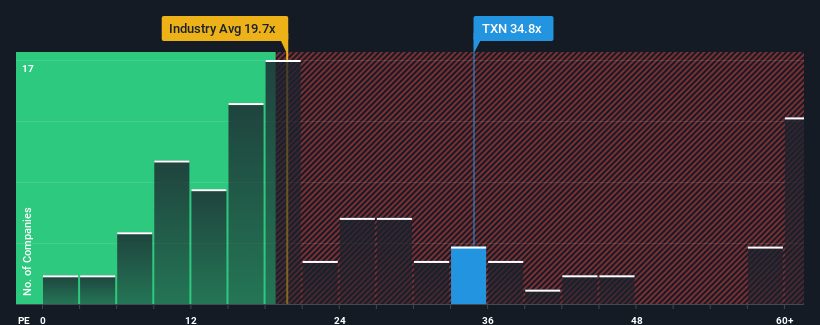- Poland
- /
- Professional Services
- /
- WSE:TXN
Tax-Net S.A. (WSE:TXN) Investors Are Less Pessimistic Than Expected

When close to half the companies in Poland have price-to-earnings ratios (or "P/E's") below 12x, you may consider Tax-Net S.A. (WSE:TXN) as a stock to avoid entirely with its 34.8x P/E ratio. However, the P/E might be quite high for a reason and it requires further investigation to determine if it's justified.
As an illustration, earnings have deteriorated at Tax-Net over the last year, which is not ideal at all. It might be that many expect the company to still outplay most other companies over the coming period, which has kept the P/E from collapsing. If not, then existing shareholders may be quite nervous about the viability of the share price.
Check out our latest analysis for Tax-Net

How Is Tax-Net's Growth Trending?
There's an inherent assumption that a company should far outperform the market for P/E ratios like Tax-Net's to be considered reasonable.
Retrospectively, the last year delivered a frustrating 37% decrease to the company's bottom line. This means it has also seen a slide in earnings over the longer-term as EPS is down 21% in total over the last three years. So unfortunately, we have to acknowledge that the company has not done a great job of growing earnings over that time.
Comparing that to the market, which is predicted to deliver 7.5% growth in the next 12 months, the company's downward momentum based on recent medium-term earnings results is a sobering picture.
With this information, we find it concerning that Tax-Net is trading at a P/E higher than the market. Apparently many investors in the company are way more bullish than recent times would indicate and aren't willing to let go of their stock at any price. There's a very good chance existing shareholders are setting themselves up for future disappointment if the P/E falls to levels more in line with the recent negative growth rates.
The Final Word
While the price-to-earnings ratio shouldn't be the defining factor in whether you buy a stock or not, it's quite a capable barometer of earnings expectations.
We've established that Tax-Net currently trades on a much higher than expected P/E since its recent earnings have been in decline over the medium-term. When we see earnings heading backwards and underperforming the market forecasts, we suspect the share price is at risk of declining, sending the high P/E lower. If recent medium-term earnings trends continue, it will place shareholders' investments at significant risk and potential investors in danger of paying an excessive premium.
Don't forget that there may be other risks. For instance, we've identified 6 warning signs for Tax-Net (2 make us uncomfortable) you should be aware of.
If P/E ratios interest you, you may wish to see this free collection of other companies with strong earnings growth and low P/E ratios.
Valuation is complex, but we're here to simplify it.
Discover if Tax-Net might be undervalued or overvalued with our detailed analysis, featuring fair value estimates, potential risks, dividends, insider trades, and its financial condition.
Access Free AnalysisHave feedback on this article? Concerned about the content? Get in touch with us directly. Alternatively, email editorial-team (at) simplywallst.com.
This article by Simply Wall St is general in nature. We provide commentary based on historical data and analyst forecasts only using an unbiased methodology and our articles are not intended to be financial advice. It does not constitute a recommendation to buy or sell any stock, and does not take account of your objectives, or your financial situation. We aim to bring you long-term focused analysis driven by fundamental data. Note that our analysis may not factor in the latest price-sensitive company announcements or qualitative material. Simply Wall St has no position in any stocks mentioned.
About WSE:TXN
Tax-Net
Provides accounting and tax financial advisory services in Poland.
Flawless balance sheet moderate and pays a dividend.
Market Insights
Community Narratives


